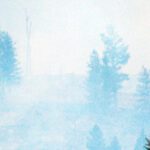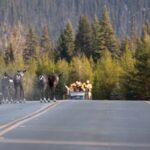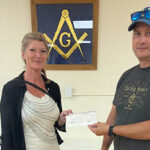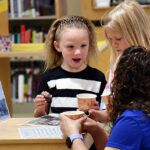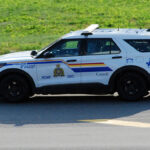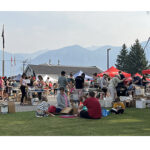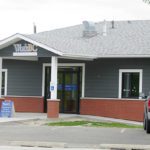Home »

Regional students go beyond recycling

This school year, 13 classes from around the Columbia Basin joined Wildsight educators on a 24-week Beyond Recycling investigation into the impact of their lifestyles—energy, waste and consumption—to discover how their everyday actions affect the health of the planet and how they can be agents of positive change.
In Cranbrook, students from St. Mary’s Catholic School recently had the opportunity to get messy, make mistakes and learn how to make their own paper. It was a fun filled morning with lots of laughter, excitement, a little chaos and plenty of hands-on learning.
“The students were very proud of their efforts and developed a new appreciation for the energy, time and resources required to make paper,” explained Wildsight Educator Patty Kolesnichenko. “The lesson was an absolute success, one that encouraged teamwork, communication and raised awareness of the efforts involved in recycling paper.”
Over in the Elk Valley, students from Rocky Mountain Elementary went on a quest to learn about where their local food comes from. There was a hunger-invoking visit to Mor Jerky, where students learned how sausages are made – complete with a sample of homemade meatballs that had everyone’s undivided attention.
This edible lesson was followed by a trip to Karen Alexander’s farm on the edge of Elkford, where students collected eggs, met some piglets and learned about bees – a lesson that included a much-anticipated taste of honey.

And in the Columbia Valley, students at Windermere Elementary School followed their energy from the dam all the way to the outlet.
“After looking at the benefits of electricity and how our lives would be different without power,” said Wildsight Educator Kim Urbaniak, “the students discussed the environmental impacts of both renewable and non-renewable energy sources and how changing our behaviour and using technology can reduce our impacts.”
Wildsight’s Beyond Recycling program aims to equip students with the knowledge they need to make important decisions for our planet, and the process of recycling paper is just one of the many hands-on learning moments. “In Beyond Recycling, students spend 24 weeks looking critically at the ecological footprint of their homes, schools and communities,” said Dawn Deydey, Beyond Recycling Coordinator. “They discover how our lifestyles impact our world and how even our everyday choices play a part in global issues like climate change.”
With Earth Day yesterday (April 22) teaching our future generations about how best to keep the Earth protected for today and tomorrow couldn’t be more timely.
Wildsight gratefully acknowledges the financial support of the Columbia Basin Trust, Columbia Shuswap Regional District, Fortis BC, Natural Sciences and Engineering Research Council, BC Gaming Commission, Regional District of Central Kootenay, TD Friends of the Environment, and WC Kitchen Foundation for Beyond Recycling.
Lead image: Students at Windermere Elementary School follow the energy from the dam to outlet. Photos courtesy Wildsight
